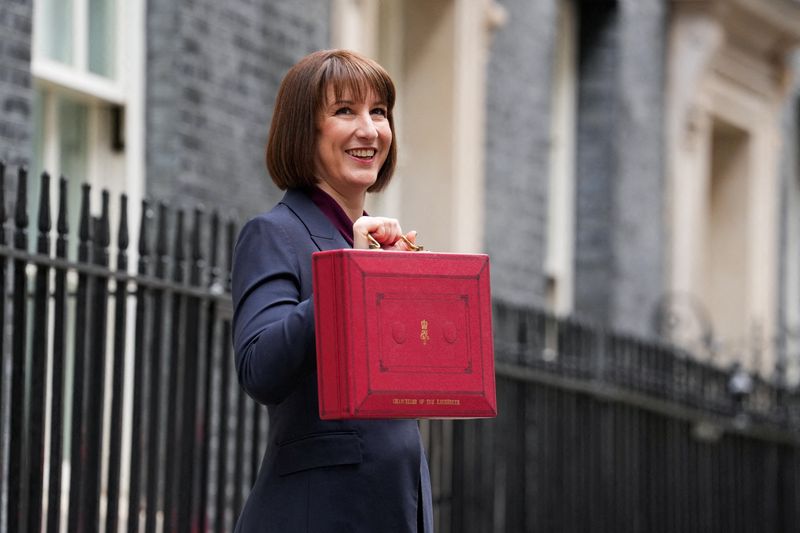By David Milliken, Sachin Ravikumar and Andy Bruce
LONDON (Reuters) - Britain's new finance minister Rachel Reeves announced the biggest tax increases in three decades in her first budget on Wednesday, saying she had to repair the country's broken public services with heavy spending.
Businesses and the wealthy faced the brunt of the tax hikes and Reeves also paved the way for higher borrowing for investment to speed up an economy hit by the 2007-09 financial crisis, Brexit, COVID and soaring energy prices.
The former Bank of England economist - who told parliament of her pride at being the first female Chancellor of the Exchequer - vowed no repeat of former Prime Minister Liz Truss's unfunded tax cuts which caused a bond slump in 2022.
Investors were initially unfazed by the Labour Party's economic programme. But government bond prices fell later as the scale of the planned spending became clear and investors scaled back their bets on Bank of England interest rate cuts next year.
Reeves said she would raise taxes by 40 billion pounds ($52 billion) a year, blaming the Conservatives for leaving her Labour Party with a budget "black hole".
"Any responsible Chancellor would take action," she said. "That is why today, I am restoring stability to our public finances and rebuilding our public services."
She painted a grim picture of record waiting times in the health service, children studying in crumbling schools and dysfunctional transport and justice systems.
But in a setback for Reeves, Britain's budget watchdog said the economy would grow less than it previously thought in 2026-2028 after outperforming only slightly in 2024 and 2025.
The watchdog said higher public investment was likely to boost growth but mostly only in the 2030s.
"This is, in some sense, the central trade-off of this budget," Ben Zaranko, an economist with the Institute for Fiscal Studies think tank, said. "Tens of billions of extra borrowing for investment might push up interest rates but that's seen as a price worth paying for the long-term benefits."
Reeves' plans will take the government's tax take to a historic high of 38.2% of economic output by 2030. That is still lower than in many other European economies but is up from 36.4% now and more than 5 points higher than before the pandemic.
According to the IFS, tax hikes of 40 billion pounds would be equivalent to 1.25% of economic output, surpassed in recent history only in 1993 by a budget plan under the Conservatives.
Prime Minister Keir Starmer had said the budget would target "those with the broadest shoulders" to spare "working people."
The yield on 10-year British government bonds - which moves in the opposite direction to prices - was up by about three basis points in late trade after dropping during Reeves' speech.
Investors were pricing fewer BoE interest rate cuts in 2025 given the inflationary impact of higher government spending.
TAXES UP FOR BUSINESSES AND THE WEALTHY
Reeves announced a string of tax increases to meet her new rule for day-to-day spending to be in balance by 2030.
The rate of social security contributions paid by employers will rise by 1.2 percentage points to 15% from April, and a threshold at which firms start paying it will fall, generating an extra 25 billion pounds a year in five years' time.
Company bosses warned that higher taxes, combined with planned new protections for workers and minimum wage rises, could undermine Labour's growth ambitions.
"This is a tough budget for business," Rain Newton-Smith, the Confederation of British Industry's chief executive, said.
A cap on a tax on business profits was welcome but the overall rise in employer costs would "hit the ability to invest and ultimately make it more expensive to hire people or give pay rises," she said.
Other revenue-raisers included changes to capital gains and inheritances and tax paid by private equity executives, non-domiciled residents, North Sea oil and gas firms and users of private jets and private schools.
But Reeves unexpectedly ruled out making more individuals pay basic and higher income tax rates after a freeze on the threshold for payments expires in 2028/29.
She also extended a freeze on fuel duty and cut a tax on draught beer in pubs, measures that could help reverse a fall in support for Starmer's fledgling government in opinion polls.
Asked by the BBC if she planned further similarly big tax increases in future, Reeves said: "This is not the sort of budget we would want to repeat, this is the budget that is needed to wipe the slate clean."
In another significant move, Reeves said she would change a second fiscal rule to allow for more borrowing, paving the way for 100 billion pounds in investment over the next five years.
Reeves said she would now target a fall in public sector net financial liabilities as a share of the economy, rather than public sector net debt excluding the BoE.
The latest forecasts showed the government was on course to borrow almost 142 billion pounds more over the next five years than previously estimated.
Combined with higher taxes, the outlook for investors remained difficult, Neil Birrell, Chief Investment Officer with Premier Miton Investors, said.

"It’s likely that gilt and equity markets will view the package as not as bad as it could have been. But with the investment plans being long-term in nature, it doesn’t feel like a budget for growth," he said.
($1 = 0.7686 pounds)
